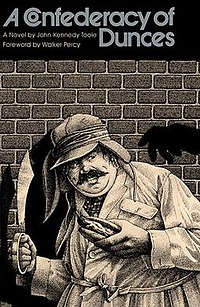A Confederacy of Dunces
 |
|
| Author | John Kennedy Toole |
|---|---|
| Country | United States |
| Language | English |
| Genre | Comedy, tragicomedy |
| Published | 1980 (Louisiana State University Press) |
| Media type | Print (hardback, paperback), audiobook, e-book |
| Pages | 405 pp (paperback) |
| ISBN | |
| OCLC | 5336849 |
| 813/.5/4 | |
| LC Class | PS3570.O54 C66 1980 |
A Confederacy of Dunces is a picaresque novel by American novelist John Kennedy Toole which reached publication in 1980, eleven years after Toole's suicide. Published through the efforts of writer Walker Percy (who also contributed a foreword) and Toole's mother, the book became first a cult classic, then a mainstream success; it earned Toole a posthumous Pulitzer Prize for Fiction in 1981, and is now considered a canonical work of modern literature of the Southern United States.
The book's title refers to an epigraph from Jonathan Swift's essay Thoughts on Various Subjects, Moral and Diverting: "When a true genius appears in the world, you may know him by this sign, that the dunces are all in confederacy against him." Its central character, Ignatius J. Reilly, is an educated but slothful 30-year-old man living with his mother in the Uptown neighborhood of early-1960s New Orleans who, in his quest for employment, has various adventures with colorful French Quarter characters. Toole wrote the novel in 1963 during his last few months in Puerto Rico.
Ignatius Jacques Reilly is something of a modern Don Quixote—eccentric, idealistic, and creative, sometimes to the point of delusion. In his foreword to the book, Walker Percy describes Ignatius as a "slob extraordinary, a mad Oliver Hardy, a fat Don Quixote, a perverse Thomas Aquinas rolled into one". He disdains modernity, particularly pop culture. The disdain becomes his obsession: he goes to movies in order to mock their perversity and express his outrage with the contemporary world's lack of "theology and geometry". He prefers the scholastic philosophy of the Middle Ages, and the Early Medieval philosopher Boethius in particular. However, he also enjoys many modern comforts and conveniences and is given to claiming that the rednecks of rural Louisiana hate all modern technology which they associate with progress. The workings of his pyloric valve play an important role in his life, reacting strongly to incidents in a fashion that he likens to Cassandra in terms of prophetic significance.
...
Wikipedia
